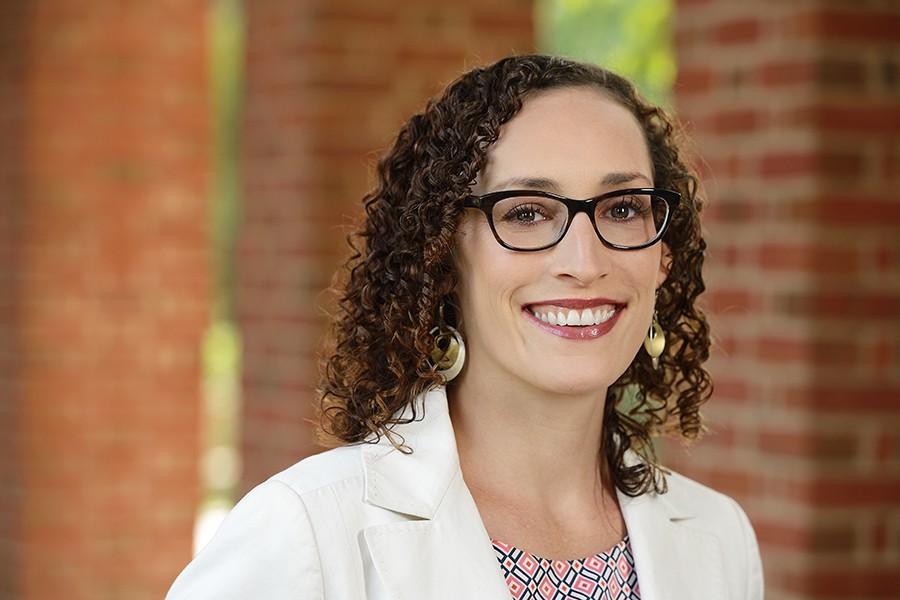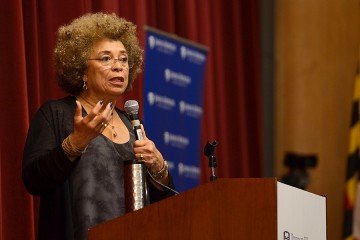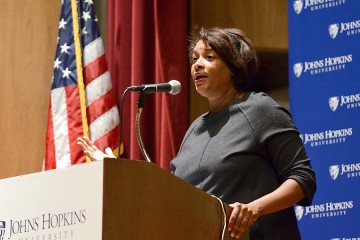Outside Baltimore's Lexington Market recently, there stood a portal—a gold-painted shipping container with a video screen and microphone inside. From there, visitors could connect live with residents of Los Angeles, Milwaukee, Mexico City, and Chicago.
The goal of the installation, part of the broader Portals for Research project, was to start conversations about a common social issue these cities share: unrest related to police violence. Ultimately, political scientist Vesla Weaver, a new Bloomberg Distinguished Associate Professor at Johns Hopkins University, intends to use transcripts of these conversations as one dimension of her new book, The Faces of American Democracy.
The survey project is the first of its kind to examine systematically the ways low-income black and Latino citizens in the U.S. experience and respond not only to policing and incarceration but also to various other layers of government, such as welfare agencies, housing authorities, and schools. Weaver, a leading scholar on racial politics and criminal justice issues in America, initiated the research as part of a Carnegie Fellowship in response to findings in Ferguson, Missouri, after the fatal police shooting of Michael Brown.
Today's the day we officially unveil the #BaltimorePortal with a live exchange to a refugee camp in Berlin. pic.twitter.com/zcAnm9JaP2
— Downtown Baltimore (@DowntownBalt) February 14, 2017
"We cannot understand modern inequality or begin to move past the harms of incarceration and surveillance without understanding that punitive action is threaded through a multiplicity of activities and agencies in poor communities," Weaver says.
The Portals project builds on the trailblazing research Weaver has conducted since the start of her career: mining the root causes of inequality and mass incarceration in today's America.
Weaver, who joined Johns Hopkins this fall after faculty posts at Yale and the University of Virginia, is perhaps best known as a leader in the movement to push the social sciences to understand punishment as a crucial site of governance in the U.S. as well as a forceful mechanism of racial inequity. With her research, she has informed one of the central questions facing policymakers today: how to grapple with the consequences of nearly four decades of state-enforced discipline for citizens and communities.
In the early years of her graduate studies at Harvard, Weaver bucked against the common thinking that punishment was not a core concern for political science, successfully arguing that incarceration and surveillance influenced America's post-war institutions in ways that critically altered the racial politics and inequality of later decades.
"I began to construct a political story for why incarceration rates rose in the U.S. when they did, and that this was not a coincidence," she says, pointing to the 1960s civil rights movement as the breeding ground for policies "that were purportedly about crime but underneath that [were] responding to racial changes and student unrest that people were uncomfortable with."
These topics became the basis for her dissertation "Frontlash: Civil Rights, the Carceral State, and the Transformation of American Politics," and a related article for the Studies in American Political Development.
Later, as a professor at Yale, Weaver embarked on the first large-scale empirical study of how these seismic shifts in incarceration and policing shaped the political and civic realities in the communities most affected. Her 2014 book, Arresting Citizenship, developed the idea that criminal justice reforms created a state she calls "custodial citizenship"—an ever-growing demographic of Americans who equate government with control and, as a result, become less likely to take part in the political process.
The study, which won the Dennis Judd Best Book Award in urban politics, moves the topic of mass incarceration to the forefront of political science debates and has served as a reference source for organizations like the Prison Policy Initiative and the National Research Council.
As Weaver now completes The Faces of American Democracy, she is also working on another book, funded by the Russell Sage Foundation, investigating the growth of economic inequality among black and Latino people. Despite long-standing racial group solidarity, this new inequality is causing unfamiliar political rifts over issues like housing, crime, and school policy.
Also see
Weaver, who grew up in northern Virginia, studied government as an undergraduate at the University of Virginia, where she later joined the faculty in 2007. In the intervening years, she earned her doctorate in government and social policy at Harvard, where she also worked on the university's Civil Rights Project.
In 2012, Weaver moved on to Yale, where she became a tenured associate professor in African-American studies and political science. She served on the Executive Session on Community Corrections, a project of the National Institute of Justice, among others, and in 2015 founded the Center for the Study of Inequality.
Joining Johns Hopkins this fall along with her husband, philosopher Christopher Lebron, Weaver says Baltimore is a place "where the kind of research I do—on policing, on racial inequality—can really matter for the city."
Weaver's new appointment bridges the Political Science and Sociology departments within the Krieger School of Arts and Sciences. She is also part of the Social Policy program, for which she is co-teaching a course on inequality this fall.
"This is a pivotal time in our country as we grapple with issues of racial division, inequality, politics, and the justice system," said Beverly Wendland, dean of the Krieger School. "I am confident that Dr. Weaver's research in these areas will help position Johns Hopkins as a leader in understanding these pressing societal challenges and devising solutions that promote equality."
In joining the Bloomberg Distinguished Professorships program, Weaver takes her place within an interdisciplinary group of scholars at Johns Hopkins working to address major world problems and teach the next generation. The program is backed by a $350 million gift from Johns Hopkins alumnus, philanthropist, and three-term New York City Mayor Michael R. Bloomberg.
"We are thrilled to welcome Dr. Weaver, a national voice on issues at the intersection of race and politics, to the Johns Hopkins community," says Sunil Kumar, the university's provost and senior vice president for academic affairs. "Dr. Weaver's record of convening scholars to tackle national issues, modernizing education to reflect the evolving challenges we face, and informing policy at the local and national levels reflects the intention of Mike Bloomberg's visionary gift to bring such interdisciplinary thought leaders to Johns Hopkins."










